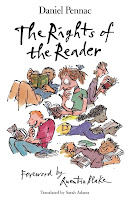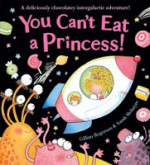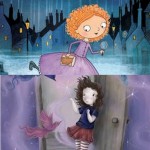Daniel Pennac
with illustrations by Quentin Blake, translated by Sarah Ardizzone (née Adams)
(Walker books)
Parents, teachers, librarians,please on no account use these pages
as an instrument of torture.
These words of caution from the author at the very beginning of the book set the tone of one of my most favourite books. Daniel Pennac is a bestselling French author of both children’s and adult fiction. This short autobiographical non-fiction title was originally published in 1992 in France and has sold over a million copies there. This Walker Books edition is the book’s second translation, this time by the amazing Sarah Adams (now known as Sarah Ardizzone). In The Rights of the Reader, Pennac draws from his experiences as a child, as a parent and as a teacher in inner-city Paris to create an ode to reading for pleasure.
The book looks at what makes us become readers as well as what might get in the way of us becoming lifelong readers and enjoying books for pleasure. It is at times heart-warming, at times exhilarating, at times heartbreaking. But I cannot begin to tell you how inspirational this book is to me. It is one of the most honest and thought-provoking books on the subject of reading and books you are likely to come across, ever. There are so many pearls of wisdom in this book, it would be impossible to list them all. But I will use a few to help me show you how wonderful this book really is.
“What great teachers we were, when we didn’t worry about methods”
Pennac says about parents reading, worry-free, to their preschoolers. He then goes on to discuss how we, as parents, then break this habit when our children start school. Why do we suddenly change our attitude to reading? How can we destroy all we have built in those precious first years, the cosy closeness of storytime, the fun of making funny voices, of roaring with lions, of shouting to Rosie to watch out for the fox, and turn reading into a chore, the book into a weapon against them? How do we manage to take all the fun out of reading? Pennac first explores how things suddenly go wrong. According to him, school, on the whole, is to blame. Obviously he means the French education system, which I have experienced, but school here is not so different. We want to quantify reading. We want to make it something that can be assessed, analyzed. By doing just that, we put off whole generations of children.
“You can’t make someone read. Just as you can’t make them fall in love, or dream …”
The crushing reality is quite clear: you are never going to make a child read if they don’t want to. But you can help find books or have reading experiences that might reignite their love of stories.
Without ever being preachy or moralising, Pennac offers suggestions as to how to entice our offspring/students back into believing in reading. Some might never rekindle it, and Pennac feels sorry for them, acknowledging the void this must leave in their lives.
This is the book that every teacher, every librarian, every parent should read.
I could go on for ever about this beautiful piece of writing, and quote you the entire book, because in The Rights of the Reader, every sentence, every word matters. Thankfully, Pennac summarises his feelings about approaching reading in a tidy ten rights of the reader (imprescriptible rights of the reader in the French original text) which conclude the book:
1. The right not to read
2. The right to skip
3. The right not to finish a book
4. The right to read it again
5. The right to read anything
6. The right to mistake a book for real life
7. The right to read anywhere
8. The right to dip in
9. The right to read out loud
10. The right to be quiet
All these have applied to me, at some point in my life, and most of them still do, on a daily basis!
Those ten rights inspired Walker Books to create the most amazing poster (find it here), illustrated by Quentin Blake (the French really miss out here, as their edition is not illustrated). Print it out, post everywhere you can; this is the gospel by which we should all approach reading promotion to children.
This review was written for Translation Month, which is taking place over at Mostly Reading YA and is being posted there simultaneously.






